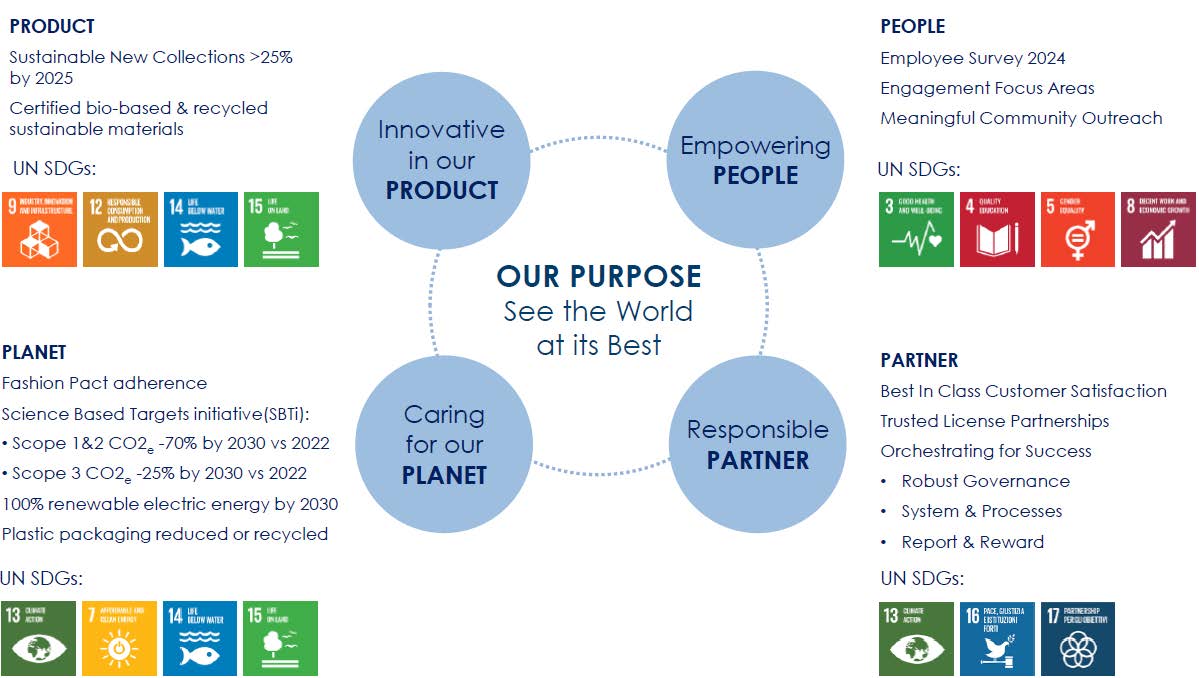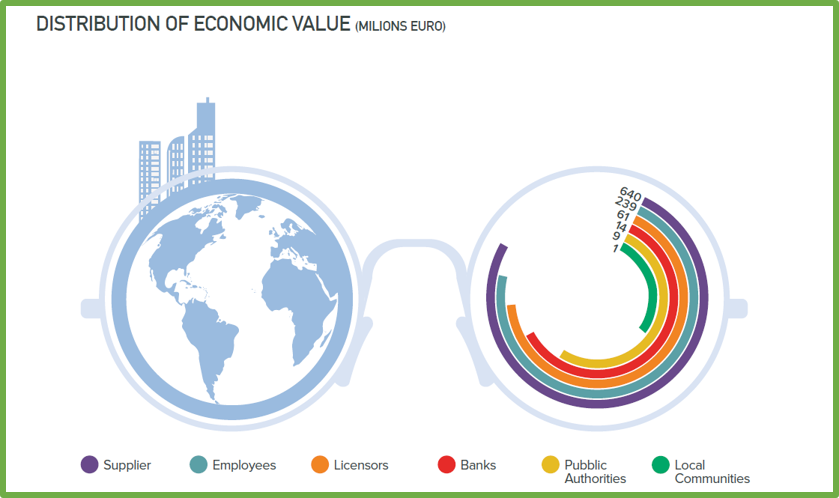The Safilo way
A forward-looking vision to a sustainable future
Safilo’s sustainability vision
A sustainable business not only creates high quality products, but also delivers value that lasts over time, that benefits people, customers, employees and all stakeholders, and, at the same time, protects the planet’s resources. Sustainability is at the core of our business strategies and is based on developing projects and initiatives that can contribute to reaching the United Nations’ Sustainable Development Goals for 2030.
CEO’s letter
Strategies for a sustainable future
One of the main challenges we face as a business is to minimize our environmental impact, reducing consumption and preserving our planet’s resources for generations to come. To contribute to a sustainable future, we invest in Digital Transformation and Innovation.
Social and environmental responsibility
The social and environmental policies outlined in our Worldwide Business Conduct Manual guide the way in which we build relationships of trust with our employees, consumers, customers and suppliers, as well as with communities, to grow together in a sustainable way. For us, responsibility towards people means being authentic and trustworthy, working with transparency and clarity at all times.
Improving people’s lives has always been our goal. We help people all over the world to see, not only with our glasses but also by promoting healthy lifestyles and behaviours. The idea of creating shared and lasting wellbeing is central to all our strategic areas: relationships with employees, product integrity, our commitment to cultivating talents, the importance of protecting the sight of future generations and vulnerable people, environmental protection and the opportunity to contribute to improving living conditions of local communities.
Our Group Environmental Policy is based on five pillars:
Full compliance with environmental laws and regulations
Optimisation of processes to minimise environmental impact
Creation of greater awareness in the supply chain
Involvement and empowerment of all workers
Transparency towards stakeholders
We exceed all the requirements of environmental regulations such as those governing the use, control, transport, storage and disposal of materials that may be dispersed in the natural environment, as part of wastewater, air emissions, solid or hazardous waste.
Our strategy
Our sustainability strategy is developed in 4 pillars and their related goals:
1) Product Innovation
We are committed to continuous innovation of our products and our industrial process enabling a sustainable economy at every stage of the value chain; to this end we use the following factors:
use of low-impact raw materials for frames, lenses and cases;
responsible production - green chemistry; supply chain traceability and monitoring.
As evidence of our focus on product innovation, we are committed, starting in 2025, to realize more than 25 percent of new collections from certified sustainable materials, i.e., recycled or bio-based. We regularly carry out a thorough assessment of the emissions related to the main types of products during their life cycle (Life Cycle Assessment): by understanding what kind of impact on CO2 emissions the combinations of materials and product production processes have, we are then able to design new collections in an increasingly sustainable way. Indeed, we have the know-how to develop sustainable products with the different types of materials used (metal, acetate, injection plastics). The goal of 25 percent by 2025 is in line with the general guidelines of the Fashion Pact.
2) Planet Care
We want to contribute to reducing the impact on natural resources to protect and preserve the planet, in details:
we contribute to the reduction of carbon and greenhouse gas emissions through (i) the adoption of renewable energy, (ii) the involvement of our suppliers in decarbonisation paths, (iii) the implementation of a sustainable mobility policy and optimization of logistical flows;
we started adopting sustainable packaging, and we have dematerialized the product information notes through digitalisation.
To support our commitment to safeguarding the planet, we have decided to validate our sustainability targets with "Science Based Target initiative" (SBTi), to which we have submitted our official commitment. We are committed to reducing Scope 1 and 2 emissions by 70 percent by 2030 and Scope 3 emissions (Category 1 Purchased Goods and Category 4 Upstream Transportation and Distribution) by 25 percent by 2030, compared to the emissions published in our 2022 Consolidated Non-Financial statement. Our emissions (Scope 1 and 2) and supply chain (Scope 3) emissions are strongly influenced by electricity consumption, which is the main energy source for all business processes (production and non-production). We are therefore committed to covering 100 percent of our electricity needs with renewable electric energy by 2030. For what it concerns the logistic packaging, we are committed to eliminate the unnecessary single-use plastic in next years and substituting the remaining plastic with more sustainable alternative materials that contain at least 50 percent of recycled content.
3) Empowering People
We are committed to strengthening our vision of excellence and collaboration among people; specifically:
employees - by adopting a policy of respecting diversity, fair treatment and inclusion, promoting learning and development, ensuring safety and well-being;
communities - by privileging partnerships that foster positive social impact, education for a "better vision to see better" and thus live better;
suppliers - favouring responsible partnerships in terms of sustainability.
We continue to engage our employees in defining areas on which focusing our efforts at a global level. In the first semester of 2024 the implementation of a specific Employee Survey has been planned to gather and to assess the feedback of the employees and the organizational environment.
4) Partnership (Governance)
We want to reinforce our commitment to pursuing our customer satisfaction and maintaining the trust of our licensors. With the Sustainability Committee support, we aim at granting the adequacy of our organization, of IT processes and systems needed to ensure: i) a transparent reporting, ii) a remuneration policy connected to ESG targets, and iii) the set-up of IT systems to enhance the product traceability, product certifications management and to measure in an automatic manner the supplier Scope 3 emissions

